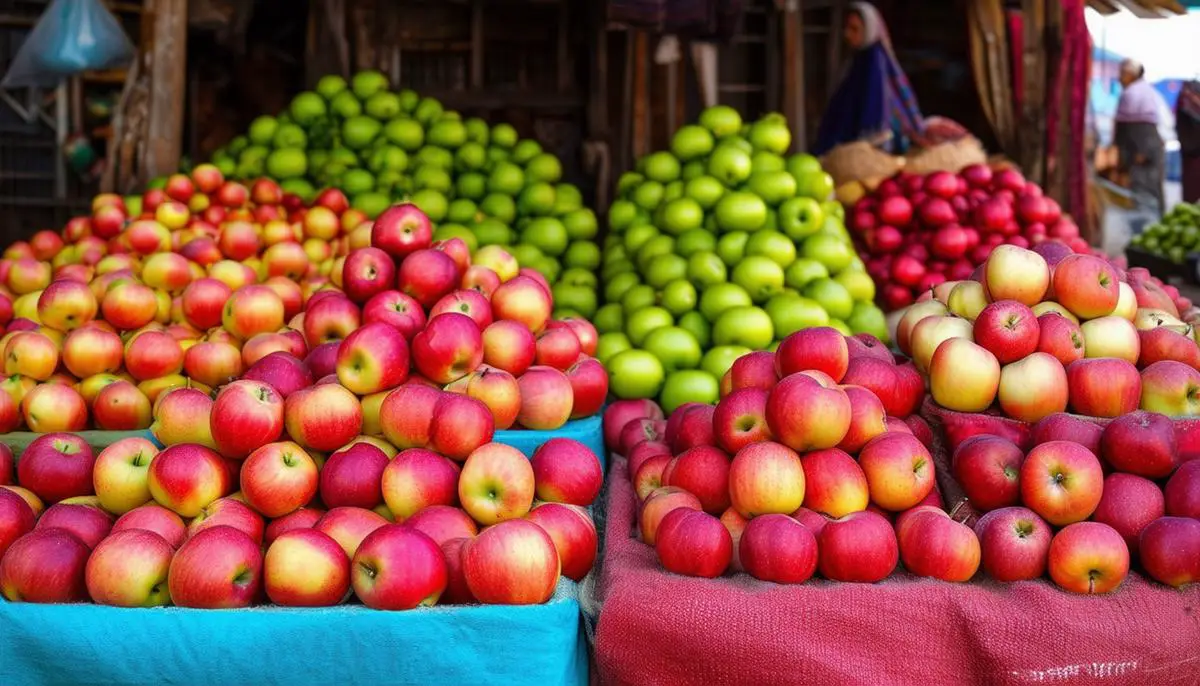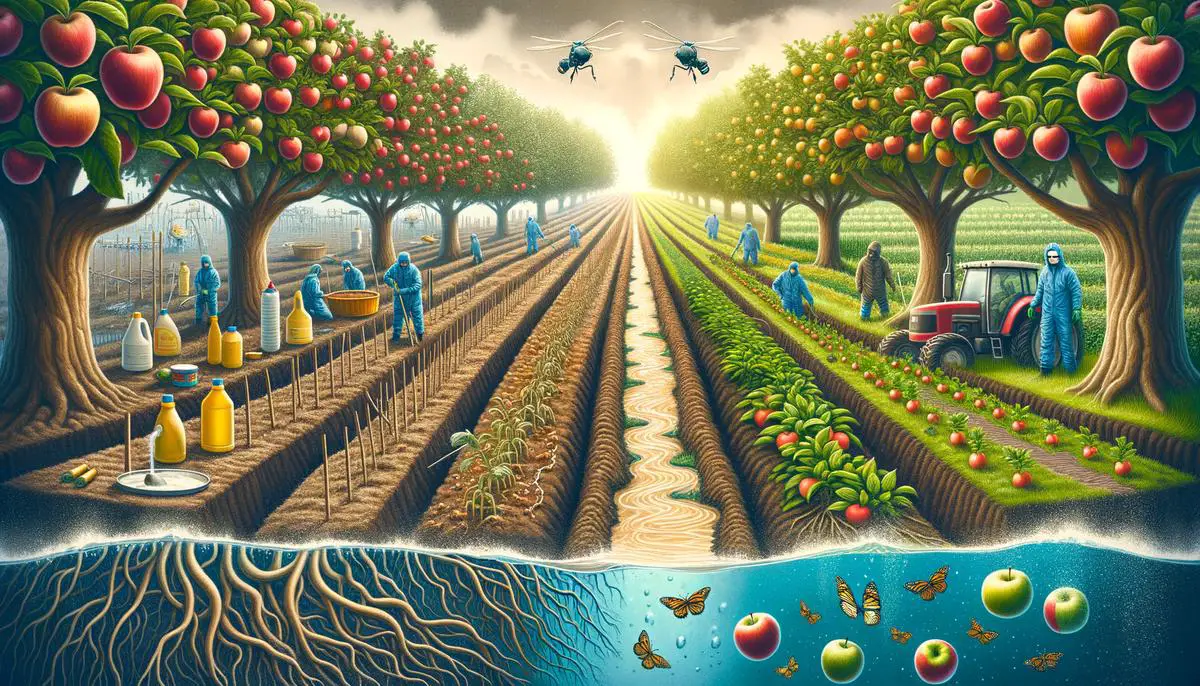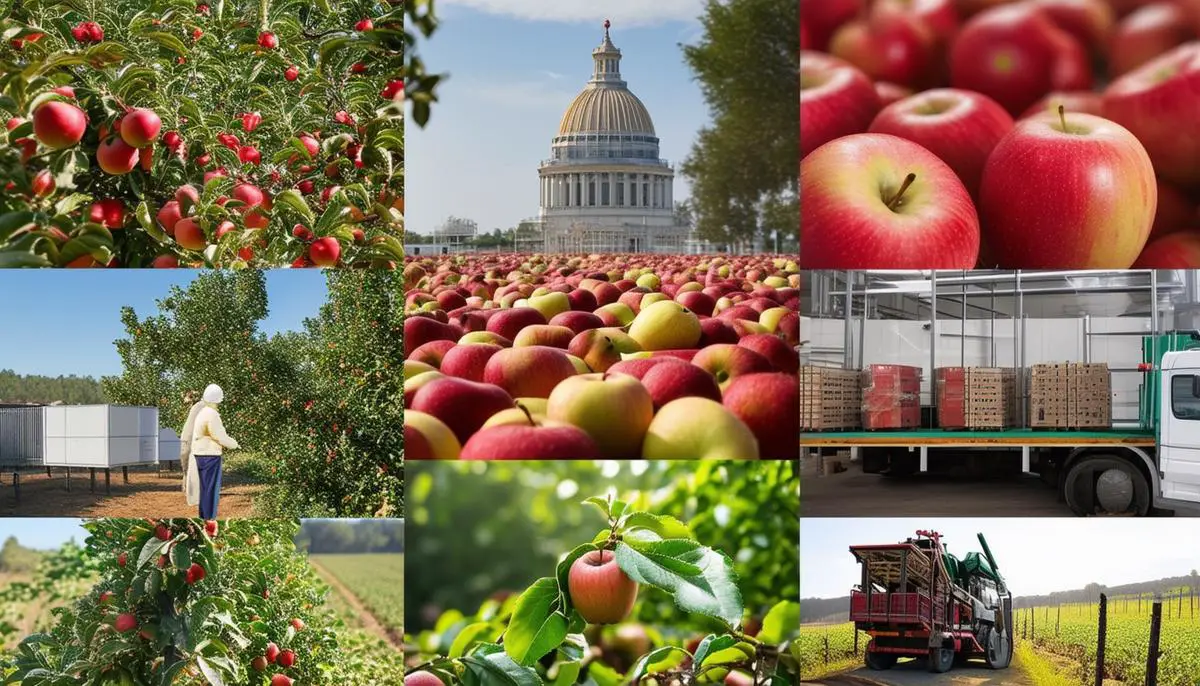Apple farming faces numerous challenges and regulations that impact both local and international markets. From stringent export rules to the pressures of import policies on domestic farmers, the landscape is complex and demanding.
Export Apple Act Regulations
The Export Apple Act, established to maintain the reputation of American-grown apples in foreign markets, lays out some strict rules. An apple must grade at least U.S. No. 1 or U.S. No. 1 Early to be fit for export, with exceptions for Pacific ports of Russia. The quality is non-negotiable—no apple maggots, no extreme deterioration from storage, and definitely no sneaky San Jose scale.
The Secretary of Agriculture's involvement carries significant weight. Their input, backed by federal regulations, ensures that only top-tier quality apples head overseas. Packaging isn't trivial—each package must have apples in the top layer that represent those beneath. No misleading "perfect on top, trash underneath" nonsense here!
Key Requirements:
- Mandatory marking of packages with grower's or packer's details, apple variety, and grade
- Rigorous inspection by the Federal or Federal-State Inspection Service
- "Export Form Certificate" declaring compliance with all Act requirements
Exemptions exist for tiny shipments under 5,000 pounds or 100 boxes. Apples heading to specific parts of the Pacific can be less mature if they sport a giant "Immature Fruit" tag. Processing apples get some leeway, provided they meet a lower grade and are clearly marked "Cannery."
Should any shipper try to cut corners, the Secretary can initiate a withholding order. These orders allow for due process, as the accused can request a hearing and present their case. Failure to respond within ten days means waived hearing rights and a likely hold on those shiny, yet-to-be-shipped apples.
Not playing by the rules means a three-year documentation requirement for any violation, ensuring no dodgy apples sneak past customs. Notices or orders don't come as silent whispers—personal service, registered mail, or leaving the notice at someone's abode guarantee the message gets through loud and clear.
These regulations ensure that only the best of American apples shine across foreign lands. So, every crisp crunch experienced anywhere outside the U.S. underscores stringent standards. The Export Apple Act is the solid backbone keeping those international apple lovers munching happily on quality American fruit.
Impacts of Import Policies on Domestic Apple Farmers
Import policies can cast quite the shadow on domestic apple farmers, particularly in regions like Kashmir. Picture a bustling apple-rich village called Tukroo in South Kashmir's Shopian district, where the economy is driven by apple farming. But here's the twist—foreign apples flooding the market, turning the local farmers' world upside down.
Rajan Kshirsagar, president of the All India Kissan Sabha (AIKS), is calling for a substantial import duty on apples. Why? Because increased imports—by a staggering 70 percent—are leaving Kashmir's apple cultivators in a bind. Imagine nurturing your orchard through the seasons, only to find the market swamped with cheaper imports from Washington, China, Iran, and South Africa.
"We demand a 100 percent duty on apple imports to protect our local farmers," – Rajan Kshirsagar
The demand for a minimum support price (MSP) grows louder. Farmers want a safety net, a guaranteed price for their labor-intensive produce. Without it, they're left at the mercy of global price fluctuations and unrelenting competition from imports.
Challenges Faced by Apple Farmers:
- Influx of cheaper imported apples
- Lack of minimum support price
- Sales of spurious fertilizers
- Inadequate crop insurance schemes
- Years of losses due to government indifference
G M Mizrab, the secretary of CPI (J&K), voices the farmers' distress over years of losses driven by government indifference. His proposal? A pragmatic market intervention scheme to lift these farmers out of despair. Imagine the relief of having government-run cold storage facilities in every district—a move that goes beyond promises and dives straight into action.
Mizrab also argues for setting up juice plants in apple-abundant districts and procuring advanced equipment to tackle diseases ravaging the orchards. It's a vision of blending tradition with technology, aiming for a future where apple farming isn't just surviving but thriving.
In this intricate web of policies and regulations, the red, juicy apple becomes more than just fruit; it's a symbol of economic stability, cultural identity, and an entire ecosystem that sustains a community.

Environmental and Social Challenges in Apple Farming
When we think of apple farming, we typically imagine sprawling orchards laden with picture-perfect fruit. However, beneath this idyllic image lies a series of environmental and social challenges that apple farmers face, with China serving as a revealing case study.
In China, apple farming is an essential part of the agricultural landscape, yet the extensive use of synthetic inputs raises significant environmental and health concerns. These chemicals pose health risks to farmers and their families, and lead to soil degradation and water contamination. It's like dressing up in the finest attire for a party only to realize your impeccable outfit is disintegrating by the minute.
Key Challenges in Apple Farming:
- Yield instability due to unpredictable climatic conditions and pest infestations
- Deterioration in apple quality from prolonged use of synthetic inputs
- Market access difficulties, especially for farmers in remote areas
- Ageing farming workforce and lack of interest from younger generations
- Inadequate agricultural policies failing to address systemic issues
Market access is a significant obstacle. Farmers, especially those in remote areas, struggle to find reliable routes to get their produce to market. They're often left at the mercy of intermediaries, who can drive hard bargains, leaving farmers with slim profits.
The ageing farming workforce adds another layer of complexity. The younger generation, enticed by urban opportunities, is increasingly shunning the fields. The ageing farmers are left to soldier on, with less vigor and outdated techniques.
Existing agricultural policies in China are falling short, doing little to mitigate the myriad factors pulling farmers deeper into unsustainable practices. There's a disconnect—a missing piece of the puzzle that's critical for creating a resilient, sustainable agricultural system.
Policymakers need to tackle these challenges head-on with a three-stage approach that encompasses understanding the problem, creating targeted solutions, and implementing them effectively. It's not just about growing apples; it's about fostering a sustainable and thriving agricultural ecosystem.

Government Interventions for Supporting Apple Farmers
Now, let's pivot to government interventions for supporting our beloved apple farmers. What strategic support can the government extend to alleviate their distress?
Key Government Interventions:
- Comprehensive Insurance Schemes: Effective safety nets designed specifically for farmers, covering losses from natural disasters, pests, and market volatility.
- Cold Storage Facilities: Government-run units in every district to preserve apple quality and give farmers flexibility in selling.
- Scientific Equipment: State-of-the-art tech to fight off pests and diseases, ensuring healthy and productive orchards.
- Market Intervention Schemes: Strategies to ensure fair prices and stabilize the market.
- Advanced Cultivation Techniques: Provision of disease-resistant rootstocks and modern farming equipment.
- Improved Market Access: Development of reliable transportation routes and reduction of bureaucratic red tape.
Market intervention schemes are critical. These strategies act as a comforting hand on the farmer's shoulder, ensuring they have a market to sell their produce at fair prices. Visualize a well-orchestrated system where the government steps in to purchase excess produce, stabilize prices, and redistribute apples to areas with high demand.
Fostering better market access should be high on the intervention list. This means developing reliable transportation routes, cutting down the bureaucratic red tape, and ensuring farmers can get their premium apples to market without having to navigate through a logistical labyrinth.
"Each element weaves into a resilient fabric. This fabric does more than just cushion falls; it uplifts the farmers, providing them a canvas where they can dream big, innovate, and grow."
In the array of government support, each element—be it comprehensive insurance, cold storage, scientific equipment, market interventions, or better market access—contributes to a stronger, more resilient apple farming sector. By implementing these measures, governments can help ensure the sustainability and profitability of apple farming for generations to come.

In every bite of an apple lies a story of resilience, regulation, and relentless effort by farmers across the globe. Whether it's maintaining high standards for exports or handling the pressures from imports, these challenges shape the future of apple farming. As we savor the crisp sweetness of this beloved fruit, let's remember the complex web of policies, practices, and people that bring it from orchard to table.
- United States Department of Agriculture. Export Apple Act Regulations. Federal Register. 2019.
- Kshirsagar R. The Impact of Import Policies on Kashmir's Apple Industry. Economic and Political Weekly. 2020.
- Zhang L, et al. Environmental and social challenges in apple farming: A case study from China. Journal of Cleaner Production. 2018.
- Food and Agriculture Organization of the United Nations. Government interventions in agriculture: A global perspective. FAO Agricultural Development Economics Policy Brief. 2021.